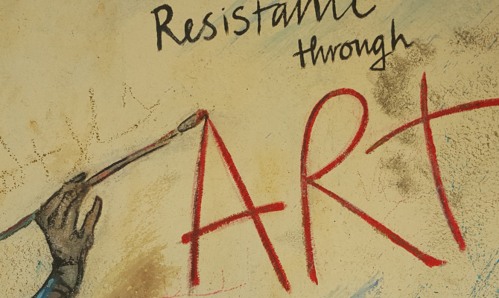The art of peace: Interrogating community-devised arts-based peacebuilding
HCRI hosts a major AHRC (Arts and Humanities Research Council) funded study entitled ‘The art of peace: Interrogating community-devised arts-based peacebuilding'.

- Grant holders: Oliver Richmond, Birte Vogel, Stefanie Kappler
- Funding agency: Arts and Humanities Research Council (AHRC)
- Amount of award: £900,000
- The project is run in partnership with In Place of War
Summary of project
I fear we [peacebuilders] see ourselves to be - and have therefore become - more technicians than artists. By virtue of this shift of perception our approaches have become too cookie-cutter-like, too reliant on what proper technique suggests as a frame of reference, and as a result, our processes are too rigid and fragile.
JP Lederach / Peace scholar
International interventions aimed at building peace in conflict and post-conflict societies have a mixed track-record at best in achieving their objectives. One of the main explanations for this is the apparent inability of international actors to reach out and connect with local communities and leaders who are key in transforming societies and enabling a lasting peace.
In recent years, arts-based approaches to peacebuilding have gained traction as an emerging area of research and practice. Despite these advances, as an area of study and practice, they remain under-researched. In particular, there is a deficit in understanding the impact community devised and led arts projects can have on peace formation at various stages of conflict amongst diverse actors.
Thus, this project investigates the potential of grassroots-led arts projects in undertaking a key role in how peace emerges within a country and stresses the agency of local people to change their society. It focuses on four very different case studies: Bosnia and Herzegovina, Colombia, Democratic Republic of Congo and Lebanon.
The project will be run by the University of Manchester, Durham University, and In Place of War with the support of several local researchers and artists, combining insights from the field of academia with local arts practitioners on the ground. Project leads will form a partnership with local organisations and actors in each of the case countries to conduct the research and devise a toolkit for grassroots and NGO practitioners on the one hand, but also to co-produce art productions on the other.
Project objectives
The project aims to determine how arts can positively contribute to peace. It builds a community of practice between academics, artists, practitioners and policy-actors to explore the transformative power of the creative arts in the context of conflict and peace. Creating an evidence-base around the impact of arts can shape new policies and NGO programming to improve the life of people in conflict-affected societies.
Thus, the project seeks to answer the following core questions:
- What role can grassroots arts play in different types and stages of war?
- Based on these insights, under what conditions can the creative arts and peace formation processes be best integrated with each other?
- How can we understand the extent to which creative arts projects help external or internal norms of peace to be adopted on a broader social level, or do they highlight local norms?
Find out more
The art of peace: Interrogating community-devised arts-based peacebuilding – project website
